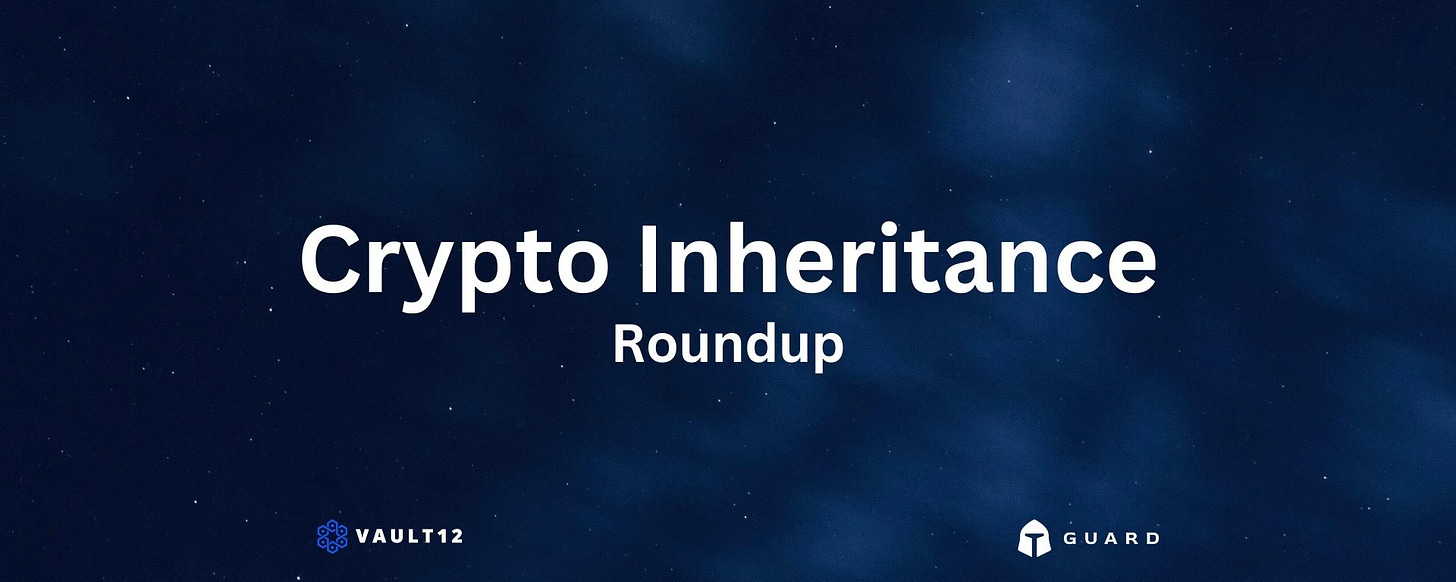Crypto Inheritance Update: April 2025
A special update for Vault12’s users on regs, the industry, and crypto inheritance management: DC Blockchain Summit
Special Update from DC Blockchain Summit 2025
Peirce: The SEC's approach has put innovators in 'straightjackets'
DC Blockchan Summit was a terrifically ebullient event, with attendees feeling enthusiastic having survived the last administration’s attempts to strangle crypto innovation in the United States.
The Summit is put on by the Digital Chamber of Commerce, which is a lobbying group that Vault12 has been a member of and has participated actively in working groups to shape bills and legislation.
Key Takeaways:
We have a clear timeline for new bills and regulations regulating crypto in the US.
First up is the Stablecoin bill, which is expected to pass and be signed into law this Spring. This is important for Vault12 customers as it means that dramatically more retail investors will be exposed to cryptocurrency and therefore the need to safeguard their digital assets.
Second is the Market Structure Bill (aka FIT21), a comprehensive bill that will define how crypto markets are regulated, the roles of security and utility tokens, and other market-defining capabilities that will eventually become the standard for worldwide crypto regulation. This is widely expected to be signed into law in August 2025.
Impact: While these bills and regulations are being worked on, attitudes and behaviour towards crypto assets may start to change; however, it is important to note that since no laws have changed, until the Market Structure Bill is in place, we remain in nebulous territory with respect to how toekns can be freely disseminated.
Further Reading:
In remarks at the DC Blockchain Summit, Commissioner Hester Peirce said, “The Crypto Task Force has had many helpful meetings with outside parties, and we already have received approximately fifty thoughtful written submissions. The Task Force’s first public roundtable last Friday was a productive conversation among thoughtful experts with varied views. Additional roundtables are on the schedule. All of this engagement is extremely helpful, as we consider how the Commission and its staff can provide clarity about what is outside of our jurisdiction and practical compliance solutions for activities that are within our jurisdiction. For example, as the discussion at our recent roundtable highlighted, the Commission needs to think separately about transactions and assets that are the subject of transactions. Many crypto assets themselves are not securities, but primary offerings of crypto assets for capital raising purposes are securities transactions. Accordingly, staff is open to inquiries about how to conduct such offerings as either registered or exempt transactions. And the Task Force welcomes well-reasoned requests for no-action letters or exemptive relief that can be finalized quickly to allow activity to start soon. Lessons learned from these short- and medium-term efforts can inform longer-term regulatory and legislative efforts.” (Remarks)
Rep. Tom Emmer (R-MN) tweeted, “Today, RepDarrenSoto and I reintroduced the bipartisan Securities Clarity Act to codify, once and for all, that, like the orange groves in SEC v. W. J. Howey Co., a digital asset is separate and distinct from an investment contract through which it may be offered. American prosperity, ingenuity, and opportunity demand legal clarity. The Securities Clarity Act is one piece of that puzzle.”
The Vault12 legal team also had separate meetings with the SEC Crypto Taskforce and is excited to continue to give feedback to the team as these regulations are formulated to optimize the crypto industry in the US.
We will issue another roundup in a couple of weeks, currently in Paris, where we are attending the Finance and Blockchain Summit held at the French Ministry of Economy and Finance during Paris Blockchain Week.
We are also trying to locate a Vault to record a podcast in.
New to Crypto Inheritance? Start here.
Worried about leaving your crypto on exchanges?
Maybe February’s massive ($1.4 Billion USD) Dubai-based Bybit exchange hack caught your attention. Fortunately, it seems that client assets are guaranteed … although this by no means implies that all future hacks of exchanges will end so neatly. The main lesson for digital asset owners might be that even professionals are susceptible to being tricked by sophisticated attackers. The concept of self-custody versus third-party custody of assets is important to understand: there are common pitfalls in trusting others to protect your assets and pitfalls of doing it yourself, as explained at a high level in “Why should you care about cryptocurrency security?”
Digital asset privacy still controversial
Privacy is one of the challenges that lingers unresolved in the digital assets space. Digital privacy is multi-faceted: what should government agencies, crypto exchanges, and the general public know about your digital asset ownership and transactions? There is a balance of arguably legitimate “need to know” by financial regulators, as well as a vast assortment of illegitimate interests that sophisticated bad actors can abuse. One aspect of this delicate balance became clearer on March 12, 2025, when the United States Congress declared that DeFi protocols do not have an obligation to report taxpayer proceeds from crypto sales to the Internal Revenue Service. (Of course, U.S. citizens still have to!) If you’d like to review and refresh your memory about protecting your privacy as a digital asset owner, don’t miss our article “Why Does Privacy Matter?” that explores related issues and offers practical recommendations.
The cat-and-mouse evolution of crypto scams and hacks
On March 10, 2025, the California Department of Financial Protection and Innovation (DFPI) updated its catalog of crypto threats, reported on numerous scam websites that it took down in 2024, and issued renewed warnings to digital asset owners to remain vigilant against trickery of all kinds. Stay aware of the evolving landscape of threats, and follow best practices to reduce your risks. Reconsider your protective habits with the help of our actionable recommendations in “11 things you need for a safer crypto environment.”




